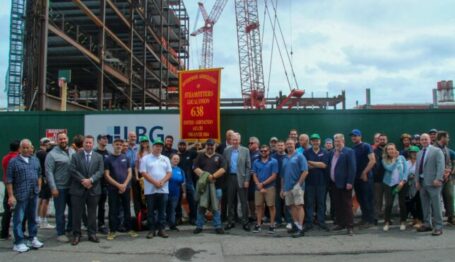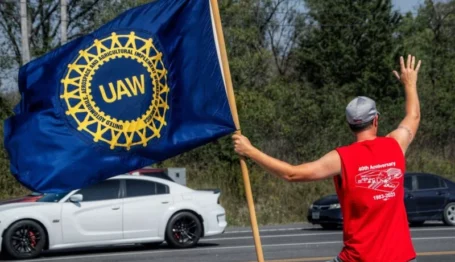Labor Watch
Why Are Some Social Justice Unionists Backing the Palestinians?
 Credit: Qrutyphoto. License: Shutterstock.
Credit: Qrutyphoto. License: Shutterstock.

Since the horrific terrorist attacks against Israel on October 7, numerous left-wing institutions have disgraced themselves by taking actions that at least appeared to side with the terrorists against their civilian victims. In perhaps the most regrettable of all illustrations of the power of social justice unionism, labor organizations joined the self-discreditation—and where they didn’t, their usual allies on the far left denounced them for craven, financially interested right-deviationism.
Let us conduct a brief tour of the more notable union actions defending the Hamas rampage, the “Palestinian cause,” or those who exposed themselves by supporting them.
Little Labor Radicalizes
Some on the union-curious right have placed their hope for a revival of class struggle and trade unionist spirit in “little labor,” focusing on the Amazon Labor Union (ALU) and Starbucks Workers United. Yet both are radical—far more radical than the major labor unions content to align with the immediate needs of the Democratic Party of the moment—and their stances on the Israel-Hamas conflict illustrate this.
The Amazon Labor Union—praised for its organizing efforts by Sen. Marco Rubio (R-FL)—got to work undermining the U.S.-Israel relationship before the outbreak of war. Campaigning alongside the extremely controversial former Women’s March leader Linda Sarsour at the Amazon Web Services summit in New York, Amazon Labor Union leader Jordan Flowers declared, “We are here today to fight back, and everyone should have their chance to say that Amazon needs to be held accountable, Google needs to be held accountable, and the Israeli government should be held accountable for all charges and crimes,” while demanding the company break deals it made with the State of Israel over cloud computing.
Starbucks Workers United, a campaign of the larger Workers United division of the Service Employees International Union, responded to the initial reports of Hamas raids from Gaza in about the worst way imaginable. The union’s official Twitter account posted (and later deleted) “Solidarity with Palestine!” in response to an image of a truck destroying the Israel-Gaza Strip border fencing. Many Hamas operatives used such gaps in the fence to enter Israel to murder civilians. The Washington Free Beacon reported, “Union chapters in Iowa, Chicago, and Boston promoted rallies in support of the Palestinian attacks, including a ‘Long Live Palestinian Resistance’ rally to be held in Boston on Monday.”
What About Big Labor?
The radical stances of the ALU and Starbucks Workers United drew attention from In These Times, a socialist movement newspaper that tracks the labor movement and other left-wing activist causes. The paper compared the radical positions of these unions and the United Electrical, Radio and Machine Workers of America (UE), which formally opposes U.S. military aid to Israel, favorably with the more pro-Israel positioning of other unions, including such banes of conservatives’ existence as Randi Weingarten’s American Federation of Teachers.
How did that happen? UE has a long and controversial history. It departed from the Congress of Industrial Organizations (CIO; later a constituent of the AFL-CIO federation) in 1949 amid disputes over Communist domination of the labor movement and whether to accede to federal rules requiring union officials to declare that they were not Communists. Since then, UE has gained a reputation as one of the most radical-left-positioned labor organizations with a notable membership (28,030 as of 2021) in the United States.
As for “little labor,” the same independence that leads right-wingers to falsely believe that independent (or independent-appearing) unions can remain politically independent or neutral outside of the economic core issues actually empowers those unions to be as insanely extremist as their activists’ hearts desire. Randi Weingarten, Mary Kay Henry of the national SEIU, Liz Shuler of the AFL-CIO, and the other national union leaders have very strong coalitional incentives not to cross the Democratic Party’s general moderately pro-Israel consensus. (Yes, it exists: Statements made by Senate Majority Leader Charles Schumer (D-NY) and President Biden about the current conflict have largely supported the Israelis, at least in theory. Practice may be another matter, but that is not yet decided.)
A further caution comes from the United Auto Workers—or at least its Harvard Graduate Student Union local. A faction of conservatives still imagines the UAW as a union of hard hats who don’t want to deal with silly social politics—indeed, who need protection from silly social politics! But the union in real life actually consists of a mix of auto workers, university graduate students, and casino workers, among others. And those graduate students are all about the silly social politics—and want there to be no consequences for actions such as signing letters blaming Israel for being attacked by Hamas. The Washington Free Beacon reported that Harvard’s UAW-affiliated union proposed a resolution to “allow students who have faced blowback for their vicious anti-Israel advocacy to apply for up to $1,500 a piece, funded not by union dues but the university’s own coffers.” Empowering Big Labor means empowering these factions, too.
Evolving Ideology
Senior, national-level union officials are old enough to have risen through a labor movement that was more closely aligned with an Israel ruled for decades and culturally dominated by a staunchly collectivist Labor Zionist movement, with whom American unionists had a strong affinity. Louis Nayman, a retired union organizer writing in Tablet, expressed disappointment in the AFL-CIO’s official statement in response to the Hamas attacks, contrasting its wishy-washiness to the small-d democratic resolution of the Cold War-era AFL-CIO leaders like George Meany and Lane Kirkland.
But as Labor Zionism has weakened in Israel (the Labor Party, which carries the flag of Labor Zionism in modern Israeli politics, fell from its maximum of 56 in 1969 to a mere four of the 120 seats in the most recent Israeli election), young labor unionists have lost a connection to the state. And as Labor Zionism crafted in the ashes of the Nazi Holocaust has declined in popularity on the Left, intersectional theory has risen. And intersectional and “decolonization” theory targets “settler colonial” nations for ultimate elimination—among them perhaps first and second are the United States and Israel. Let the would-be buyer beware.



